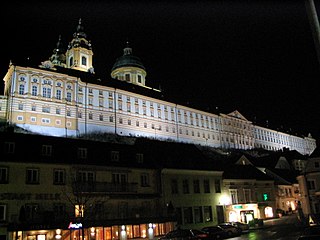
Education in the Netherlands is characterized by division: education is oriented toward the needs and background of the pupil. Education is divided over schools for different age groups, some of which are divided in streams for different educational levels. Schools are furthermore divided in public, special (religious), and general-special (neutral) schools, although there are also a few private schools. The Dutch grading scale runs from 1 to 10 (outstanding).

Gymnasium is a term in various European languages for a secondary school that prepares students for higher education at a university. It is comparable to the US English term preparatory high school. Before the 20th century, the gymnasium system was a widespread feature of educational systems throughout many European countries.

Matura or its translated terms is a Latin name for the secondary school exit exam or "maturity diploma" in various European countries centered around the former Austro-Hungarian Empire, including Albania, Austria, Bosnia and Herzegovina, Bulgaria, Croatia, Czech Republic, Hungary, Italy, Kosovo, Liechtenstein, Montenegro, North Macedonia, Poland, Serbia, Slovakia, Slovenia, Switzerland and Ukraine.

Peja is the fourth largest city of Kosovo and seat of Peja Municipality and Peja District. It is situated in the region of Rugova on the eastern section of the Accursed Mountains along Peja's Lumbardh in the western part of Kosovo.

The Republic of Austria has a free and public school system, and nine years of education are mandatory. Schools offer a series of vocational-technical and university preparatory tracks involving one to four additional years of education beyond the minimum mandatory level. The legal basis for primary and secondary education in Austria is the School Act of 1962. In 1963 it went back to the way it was. However, in 1999 it finally changed again. The Federal Ministry of Education is responsible for funding and supervising primary, secondary, and, since 2000, also tertiary education. Primary and secondary education is administered on the state level by the authorities of the respective states.
Education in Norway is mandatory for all children aged from 6 to 16. Schools are typically divided into two divisions: primary and lower secondary schooling. The majority of schools in Norway are municipal, where local governments fund and manage administration. Primary and lower secondary schools are available and free of charge for all Norwegian citizens as a given right.

Education in Serbia is divided into preschool (predškolsko), primary school, secondary school and higher education levels. It is regulated by the Ministry of Education, Science and Technological Development of the Republic of Serbia.

Education in Montenegro is regulated by the Ministry of Education and Science of Government of Montenegro.
Marin Barleti University (UMB) (Albanian: Universiteti Marin Barleti) is a private institution of higher education in Albania named after the 15th-century historian/humanist, Marin Barleti, author of the historic account on the Skanderbeg epics. The university was established in 2005 by Marin Barleti Ltd, which is part of DUDAJ Group.
The system of education in Iceland is divided in four levels: playschool, compulsory, upper secondary and higher, and is similar to that of other Nordic countries. Education is mandatory for children aged 6–16. Most institutions are funded by the state; there are very few private schools in the country. Iceland is a country with gymnasia.
Education in Croatia is a right defended by Article 66 of the Constitution which states that everyone is entitled to free compulsory education under equal conditions and in accordance with their aptitudes. Education is mandatory for children aged 6 to 14.

Haxhi Zekë Byberi mostly known as Haxhi Zeka was an Albanian nationalist leader, a member of the League of Prizren, while in 1899 he was part of the establishment and leadership of the League of Peja, another organization seeking protection of Albanians territories from Balkan states. Zeka was assassinated by a Serbian agent in 1902.

Education in Mitrovica is provided by a number of public and private institutions. With more than 36 percent of the population in Mitrovica being under 19 years old Mitrovica has a large number of primary schools, secondary schools and higher education institutes. These schools are located throughout the municipality, which is compromised by the city of Mitrovica, its 26 southern villages, and the northern part of the city.

The Special School for the Blind and Visually Impaired is located in Peja.
The first Albanian-language school in Kosovo was opened in 1889. That was the birth of public education in the well-known cultural and historical city, Prizren. "The history of our education is a story of war of efforts. A story of a small number of people, with a great spiritual world, and with a strong will to be independent."

Education in Gjilan includes primary, secondary education, and a public university. In 2018, the Organization for Security and Co-operation in Europe estimated that there were 18,370 students enrolled in kindergarten, primary and secondary educational institutions in Gjilan.

Education in Kosovo is carried out in public and private institutions. Starting from 1999, education in Kosovo was subject to reforms at all levels: from preschool education up to university level. These reforms aimed at adjusting the education in Kosovo according to European and global contemporary standards. As a first step of this new system is considered the establishment of the Department of Education and Science (DES), which is followed with the creation of legal and professional infrastructure, which should facilitate the fundamental reformation of the education, and the establishment of the Ministry of Education, Science and Technology (MEST) in March 2002. During this period the private education system began to develop.

Rozeta Hajdari is a Kosovar Albanian economist and politician, currently serving as minister of industry, entrepreneurship and trade of the Republic of Kosovo. Following a lengthy career with foreign development organizations, she joined the government as a non-partisan minister in 2020.
















